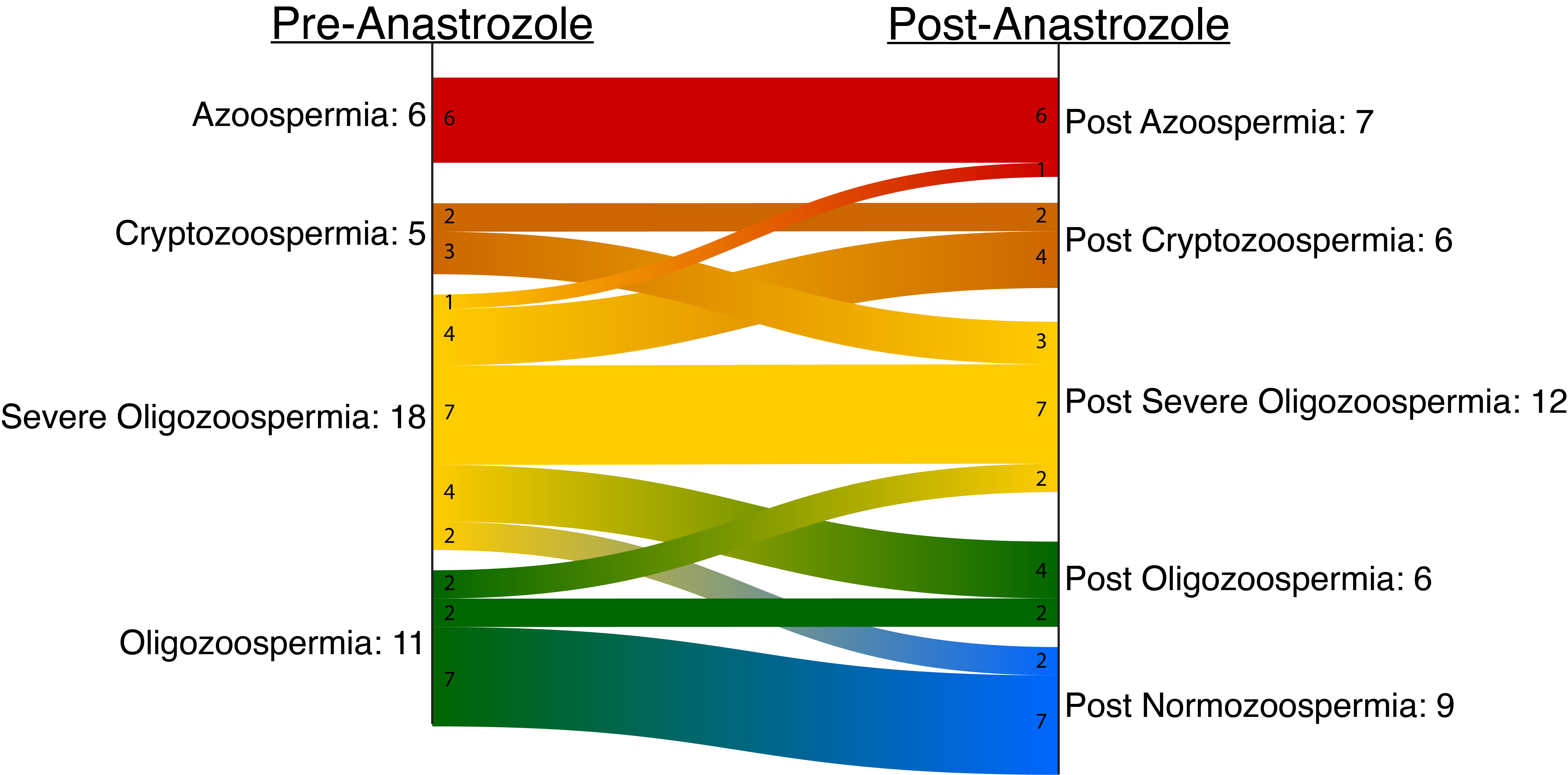Back
Poster, Podium & Video Sessions
Moderated Poster
MP34: Infertility: Therapy
MP34-11: Effect of Anastrozole on Sperm Concentration in Male Patients with Idiopathic Infertility
Saturday, May 14, 2022
4:30 PM – 5:45 PM
Location: Room 225
Bryan Naelitz*, Carlos Munoz-Lopez, Neel Parekh, Scott Lundy, Sarah Vij, Cleveland, OH

Bryan D. Naelitz, MD, MS
Resident
Cleveland Clinic
Poster Presenter(s)
Introduction: Anastrozole, a selective aromatase inhibitor, may be prescribed as empiric medical therapy in men with idiopathic infertility. The goal of this study is to identify patient factors associated with an improvement in semen parameters in patients treated with anastrozole.
Methods: We performed a single-center, retrospective cohort study of men prescribed anastrozole for idiopathic infertility. History and physical examination data were captured from the medical record, along with hormone and semen parameters. Exclusion criteria included history of prior exogenous testosterone use, grade II or III varicocele, recent scrotal surgery, and pre-treatment normozoospermia. The primary outcome was an upgrade in World Health Organization semen concentration category (WHO-SCC). Univariate logistic regression was used to identify predictors of WHO-SCC upgrade, while linear regression was used to model the association between predictor variables and change in semen concentration.
Results: 40 men were included for analysis. The median age was 35 (IQR: 31-38) and median BMI was elevated at 42 m/kg^2 (IQR: 33-53). 40% (16/40) of men exhibited an upgrade in WHO-SCC after starting anastrozole and were labeled as responders. Non-responders included the 43% (17/40) of patients with no WHO-SCC change and the 18% (7/40) of men who experienced a downgrade (Figure). Median sperm concentration increased from 2.4 to 3.9 M/mL following initiation of therapy (p=0.002). Across the cohort, levels of testosterone (409 vs 210 ng/dL, p<0.0001), LH (8.1 vs 6.2 IU/L, p=0.0003), and FSH (9.3 vs. 5.3 IU/mL, p<0.0001) increased following treatment with anastrozole. Logistic regression showed that patients with greater baseline semen concentration were more likely to experience a WHO-SCC upgrade following initiation of anastrozole (OR: 1.25, 95% CI: 1.04-1.55, p=0.03). Linear regression revealed that lower baseline levels of FSH were generally associated with improvement in semen concentration (ß: -0.28 M/IU, 95% CI: -0.65 to 0.03 M/IU, p=0.08).
Conclusions: A subset of men with idiopathic infertility experience clinical improvement in semen parameters after initiating anastrozole therapy. Men with higher pre-treatment sperm concentrations and lower baseline FSH levels may be more likely to respond to treatment.
Source of Funding: None.

Methods: We performed a single-center, retrospective cohort study of men prescribed anastrozole for idiopathic infertility. History and physical examination data were captured from the medical record, along with hormone and semen parameters. Exclusion criteria included history of prior exogenous testosterone use, grade II or III varicocele, recent scrotal surgery, and pre-treatment normozoospermia. The primary outcome was an upgrade in World Health Organization semen concentration category (WHO-SCC). Univariate logistic regression was used to identify predictors of WHO-SCC upgrade, while linear regression was used to model the association between predictor variables and change in semen concentration.
Results: 40 men were included for analysis. The median age was 35 (IQR: 31-38) and median BMI was elevated at 42 m/kg^2 (IQR: 33-53). 40% (16/40) of men exhibited an upgrade in WHO-SCC after starting anastrozole and were labeled as responders. Non-responders included the 43% (17/40) of patients with no WHO-SCC change and the 18% (7/40) of men who experienced a downgrade (Figure). Median sperm concentration increased from 2.4 to 3.9 M/mL following initiation of therapy (p=0.002). Across the cohort, levels of testosterone (409 vs 210 ng/dL, p<0.0001), LH (8.1 vs 6.2 IU/L, p=0.0003), and FSH (9.3 vs. 5.3 IU/mL, p<0.0001) increased following treatment with anastrozole. Logistic regression showed that patients with greater baseline semen concentration were more likely to experience a WHO-SCC upgrade following initiation of anastrozole (OR: 1.25, 95% CI: 1.04-1.55, p=0.03). Linear regression revealed that lower baseline levels of FSH were generally associated with improvement in semen concentration (ß: -0.28 M/IU, 95% CI: -0.65 to 0.03 M/IU, p=0.08).
Conclusions: A subset of men with idiopathic infertility experience clinical improvement in semen parameters after initiating anastrozole therapy. Men with higher pre-treatment sperm concentrations and lower baseline FSH levels may be more likely to respond to treatment.
Source of Funding: None.


.jpg)
.jpg)